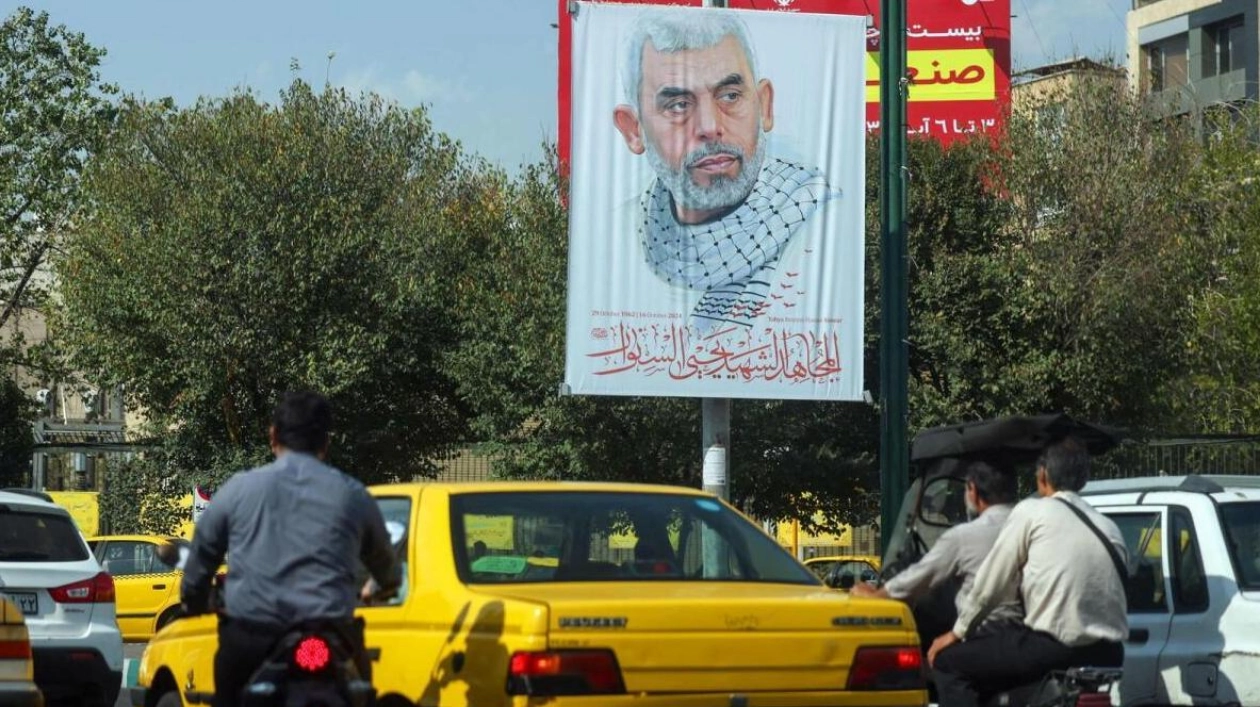People pass by a banner featuring a portrait of Hamas' late leader Yahya Sinwar on a street in Tehran on Saturday. – AFP
As Israel prepares for its promised retaliation following a missile attack earlier this month, Iran is walking a tightrope between issuing dire threats of a harsh response to any Israeli aggression and engaging in diplomatic efforts to prevent the conflict from spiraling into a full-scale regional war. On October 1, Iran launched 200 missiles at its arch-enemy in response to an Israeli strike that killed Iranian general Abbas Nilforoushan and Hezbollah leader Hassan Nasrallah in Beirut last month. The missile barrage was also a response to the killing of Hamas chief Ismail Haniyeh in Tehran in July, an attack widely attributed to Israel.
Israel has pledged to retaliate against the Iranian missile attack with a "deadly, precise, and surprising" counterstrike, according to Israeli Defense Minister Yoav Gallant, prompting Iran to warn that it would strike back if attacked. "If you make a mistake and attack our targets, whether in the region or in Iran, we will strike you again painfully," said Iran's Revolutionary Guards chief Hossein Salami on Thursday. "The Zionist enemy should know that it is nearing the end of its miserable existence," added General Mohammad Bagheri, chief of staff of the Iranian armed forces, referring to Israel as a "cancerous tumor."
Since the 1979 revolution that overthrew the US-backed Shah, the Islamic Republic has not recognized Israel and has made support for Palestinians a cornerstone of its foreign policy. Both Hamas and Hezbollah are part of the "axis of resistance," Tehran-aligned armed groups opposed to Israel. These warnings from Iran's military leaders come as Iranian Foreign Minister Abbas Araghchi embarks on a regional tour aimed at preventing the conflict from spreading. Araghchi has visited nine capitals in two weeks and spoke with UN chief Antonio Guterres on Tuesday.
Tehran-based international relations expert Ahmad Zeidabadi told AFP that Araghchi "repeats the words of the military," including that if Israel attacks, "Iran will give a painful response." Zeidabadi added that Araghchi has stated Iran is "totally ready for war," while also aiming to "reduce the escalation." The question remains as to how this balance will be achieved. Araghchi visited Beirut a week after Nasrallah's death and then went to Damascus, where he met with Syrian Foreign Minister Faisal Mekdad and President Bashar al-Assad, a close ally of Tehran.
These visits allowed Tehran to reaffirm its commitment to supporting its allies in the axis of resistance, according to Hamidreza Azizi, a Berlin-based analyst at the Middle East Council on Global Affairs. Araghchi also traveled to Saudi Arabia, Qatar, Iraq, and Oman, the latter of which has long mediated indirect talks between Iran and the United States. He then flew to Jordan and Egypt, the first visit by an Iranian foreign minister to Egypt since 2013. On Friday, Araghchi was in Turkey, where he reiterated that Iran is "ready for any situation."
Iran wants Arab countries to distance themselves from the Israeli axis, Zeidabadi said, following the normalization of ties between Israel and the UAE, Bahrain, and Morocco under the 2020 Abraham Accords backed by the US. Azizi noted that Iran is pursuing multiple objectives. In addition to reaffirming support for its allies, Araghchi has delivered a combination of warning and reassurance to some Gulf countries.
Everyone is waiting for Israel's response to the Iranian attack, and there have been discussions about the potential use of Arab states' airspace for attacking Iran, Azizi added. Araghchi has warned these countries not to allow their territory or airspace to be used for attacking Iran, while also reassuring them that Iran remains committed to improving relations. The foreign minister seeks to urgently align the policies of Iran and Arab countries and to reduce the military adventurism of Israeli leaders, according to Iran's official newspaper Iran Daily.
His diplomatic efforts aim to create peace and put an end to Israel's crimes in the region, the newspaper added.
Source link: https://www.khaleejtimes.com






